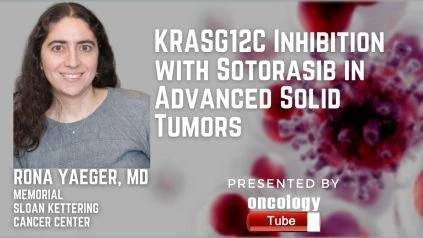Rona Yaeger, MD from Memorial Sloan Kettering Cancer Center speaks about KRASG12C Inhibition with Sotorasib in Advanced Solid Tumors.
Link to Article:
https://www.nejm.org/doi/full/10.1056/NEJMoa1917239?query=featured_home
Summary
BEGINNINGS
There are no accepted cancer therapies that target KRAS mutations. The KRAS p.G12C mutation is found in 13% of non-small-cell lung cancers (NSCLCs) and 1–3% of colorectal cancers and other cancers. Sotorasib is a small molecule that targets KRASG12C in an irreversible and selective manner.
APPROACHES
In patients with advanced solid tumors harboring the KRAS p.G12C mutation, we performed a phase 1 trial of sotorasib. Sotorasib was given orally once a day to the patients. The main goal was to ensure that everyone was secure. Pharmacokinetics and analytical response, as measured by the Response Evaluation Criteria in Solid Tumors (RECIST) version 1.1, were important secondary endpoints.
OUTCOMES
The dose progression and expansion cohorts included 129 patients (59 with NSCLC, 42 with colorectal cancer, and 28 with other tumors). Patients have previously prescribed a median of three anticancer drugs for metastatic disease (range: 0 to 11). There were no dose-limiting side symptoms or treatment-related deaths. Treatment-related adverse effects occurred in 73 patients (56.6%), with 15 patients (11.6%) experiencing grade 3 or 4 events. The median progression-free survival was 6.3 months (range, 0.0+ to 14.9 [with + meaning that the value contains patient results that were censored at data cutoff]), with 32.2 percent (19 patients) having a reported objective response (complete or partial response) and 88.1 percent (52 patients) having disease control (objective response or stable disease). The median progression-free survival was 4.0 months (range, 0.0+ to 11.1+) in the colorectal cancer subgroup, with 7.1 percent (3 patients) having a confirmed response and 73.8 percent (31 patients) having disease control. Patients with pancreatic, endometrial, and appendiceal tumors, as well as melanoma, had positive results.
FINAL RESULTS
In patients with highly pretreated advanced solid tumors harboring the KRAS p.G12C mutation, sotorasib demonstrated promising anticancer activity. Treatment-related adverse effects at grade 3 or 4 resulted in 11.6 percent of the cases. (CodeBreaK100 ClinicalTrials.gov number: NCT03600883. supported by Amgen and others.)

